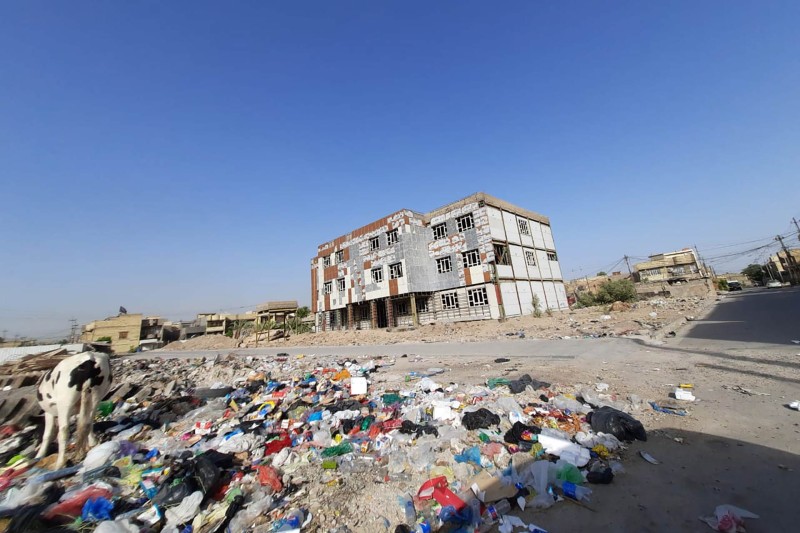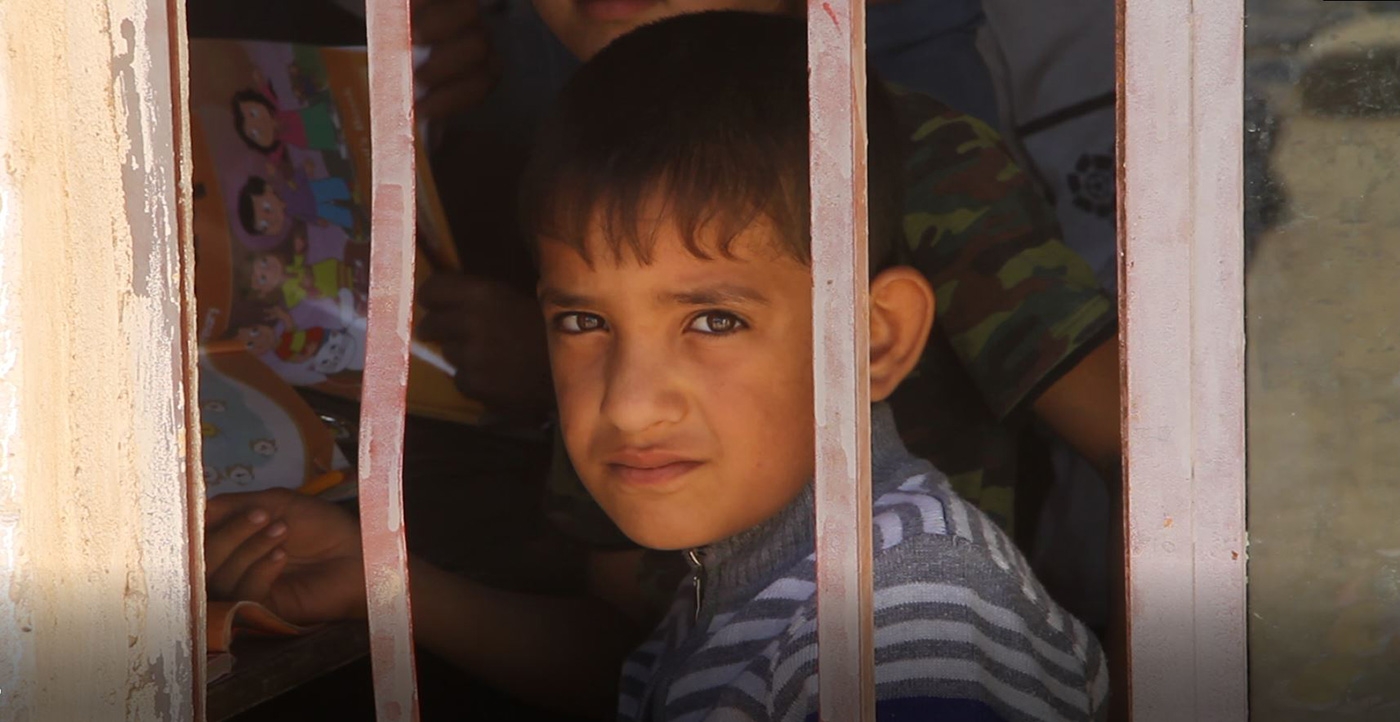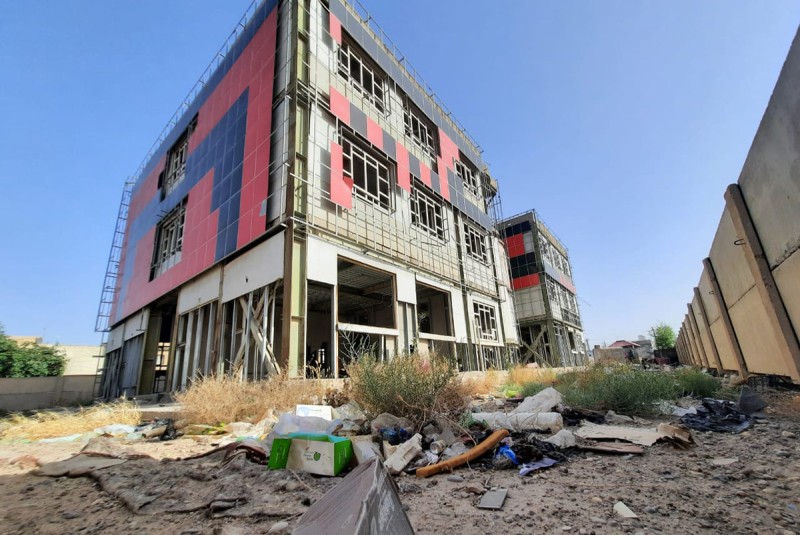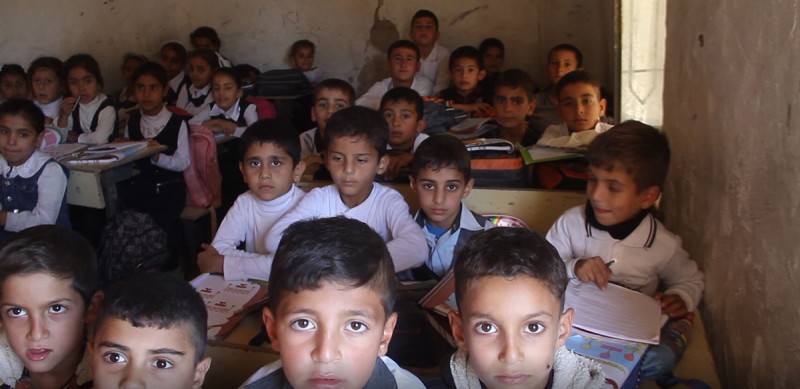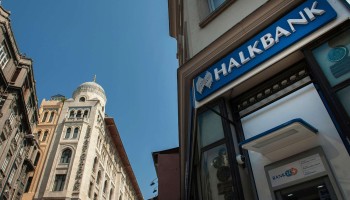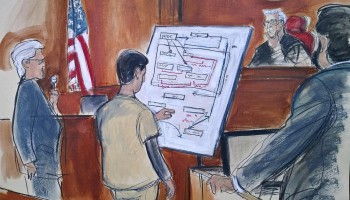Mohammad was 11 years old when teachers at his southern Baghdad school told him they would soon be moving from their dilapidated facility into a modern new building.
Today, at 24, Mohammad teaches classes in an overcrowded room in the same old crumbling structure. In Iraq’s searing summer heat, it is almost impossible to get his 60 students to sit still, let alone learn. Nearby, the planned new building remains a steel skeleton on a dirt patch strewn with garbage and populated by wandering cows.
“The modern school we were promised as children remains an elusive dream,” said Mohammad, who asked to be identified by a pseudonym to protect his job.
His school was one of 200 meant to be built by private contractors across the country in a project launched by Iraq’s Education Ministry in 2008. With hundreds of millions of dollars in funding, the effort aimed to rebuild the country’s education infrastructure after years of war and political chaos.
The program has endured a decades-long saga marked by poor administrative oversight, missed deadlines, and low-quality work. And now, 13 years later, most of the schools haven’t been finished to the government’s standards and most of the money is spent, according to government officials.
The school-building effort — known as the Duwaliya projects — came amid the broader failure of Iraq’s education system. In 2011 and 2012, the government took charge of building 1,500 other schools, mostly using state-run contractors who worked with private firms. Most of the money disappeared and only about 10 percent of the schools were finished.
One contractor was sentenced in absentia to seven years in prison and his assets seized for failing to deliver nearly 300 schools. One official was also jailed. Iraqi member of parliament Alaa Al-Rubei called the project the largest “scheme of corruption in the Iraqi state.” He said 60 percent of the advance payments were made, but “nothing equaling this amount has been accomplished.”
Today, as the state embarks on a new initiative to build another 7,000 schools, it's not clear if any of the problems have been solved.
An OCCRP investigation into the original 200-school project found a history of sweetheart deals, wasteful spending, and clear conflicts of interest, hinting at the broader dysfunction afflicting the system.
Reporters found numerous irregularities and violations in the project’s financing, both before and after it was taken over by Jordan-based contractor Al-Soqour Trading and Contracting Resources, owned by prominent Kurdish-Iraqi businessman Nozad Al-Jaf and his wife, Delnaz.
Based on leaked memos, internal company documents, and interviews with officials and employees, the investigation shows how Al-Jaf was able to use his position to obtain collateral-free loans from his own bank — which provided the financial guarantees for one of the two original projects — in an apparent conflict of interest.
Al-Jaf also continued to draw funds from the bank even after the Education Ministry stopped payments in 2014, causing tens of millions of dollars worth of losses and contributing to the bank’s near-total collapse.
Al-Jaf denies wrongdoing and in August said that 111 schools had been completed and handed over, 17 schools were cancelled, and the rest would be finished by Sept. 1. The Education Ministry disputes these figures and says it has only received 93 completed schools, despite doling out most of the money.
OCCRP reporters visited 30 of the 200 schools between June and September 6, in the cities of Baghdad, Samawah, Nasiriyah, and in the provinces of Babylon and Karbala. At the three Baghdad schools, visited in early September, workers were still painting walls and installing aluminum frames for windows and doors even after the school had supposedly been “delivered.”
The sites outside Baghdad were in various states of incompletion, and some looked as if they had not been worked on for months or years.
Close to 3.2 million Iraqi children are not attending school, according to a United Nations report, in part because of a shortage of facilities. Like Mohammad’s, around one-third of schools run double shifts, and some even have triple shifts. High dropout rates are an ongoing issue. According to Iraq’s Education Ministry, the country still needs 11,000 new schools.
"Decades of conflict and under-investment in Iraq have destroyed what used to be the best education system in the region and severely curtailed Iraqi children’s access to quality learning,” the UN report said.
Mohamed Al-Daraji, a member of parliament who served as minister of construction and housing from 2010 to 2014, pointed to the school-building projects as an example of what has gone wrong.
They were, he said, “a failure that should be studied and not be repeated.”
Troubled From the Start
The Duwaliya projects, one focusing on Baghdad and one covering other parts of the country, were dogged by controversy from the start.
The story began under Prime Minister Nouri Al-Maliki, whose eight years in power from 2006 to 2014 ended in disaster when Islamic State militants seized about a third of the country. Allegations of corruption were widespread under Maliki, with hundreds of billions of dollars allegedly vanishing from government coffers.
Former Education Minister Khudeir Al-Khuzaie launched the school project in 2008, allocating 282 billion Iraqi dinars — about $239 million at the time — to build 200 schools under two separate contracts, known as Duwaliya 1 and Duwaliya 2.
Al-Khuzaie awarded the contracts directly to four contractors, without competitive tenders. This is technically permitted by Iraq’s public contracting law — so that “speed and efficiency in implementation” can be assured — but his move drew criticism for inflating the cost of the work.
Fadel Al-Massoudi, head of the local branch of the Iraqi Contractors Union in the Babylon governorate south of Baghdad, told OCCRP that a standard 12-classroom school in Babylon should cost between $600,000 to $700,000. The Duwaliya contracts, however, implied an average cost of around 1.2 million dollars per school.
Both contracts allowed contractors to request a 20 percent advance payment on their work if they could present a letter issued by an accredited bank in Iraq guaranteeing the work would be finished.
North Bank for Finance and Investment, where Al-Jaf serves as chairman, provided a letter of guarantee for the four contractors on the first contract’s advance payment of 28.6 billion dinars — about $24.2 million at the time. Under this guarantee, if the contractors failed to complete the work, Al-Jaf’s bank would be required to pay the money back to the ministry.
Dijlah and Furat Bank for Development and Investment, a private bank, guaranteed the second contract for 27.8 billion dinars, or about $23.5 million.
The contracts were due to finish by the end of 2010, including about 180 days of construction and another year to ensure the schools’ quality. A penalty of 77 million dinars was set for each day of delay.
In 2011, Iraq’s Federal Board of Supreme Audits reported a “low percentage of completion” for both projects. The contracts were subsequently terminated, and Al-Khuzaie came under fire from all sides.
Maha Al-Douri, who was then a parliamentarian and member of the National Alliance, a Shi’ite parliamentary bloc, accused the minister and the council of ministers of wasting around $250 million in public funds. Maliki’s own former finance minister, Baqir Jabr Al-Zubeidi, accused Al-Khuzaie of destroying Iraq’s education system by contracting with an Iranian firm that took a 20-percent down payment and did nothing but send iron bars.
OCCRP attempted to reach Al-Khuzaie through his office, but he did not respond to requests for comment.
With the project apparently at a standstill, the Education Ministry asked North Bank to repay the guarantee.
But Al-Jaf quickly proposed an alternative to spare North Bank from paying back the penalties for the delays and the money guaranteed. “We were not ready to pay fines to the government and the Education Ministry for the games they played among themselves,” Al-Jaf told OCCRP.
Contract Irregularities
Al-Jaf’s Maneuver
A little over a decade earlier, Al-Jaf had set up his own construction and import and export company in Jordan, Al-Soqour, owned jointly by him and his wife, Delnaz.
According to Al-Jaf, the operation was a modest one. But Al-Jaf’s political connections helped him persuade officials to let Al-Soqour take over the school-building project, according to North Bank board members and executives.
Al-Jaf also secured approval from three members of the original construction coalition.
The Education Ministry — by then under the direction of Muhammad Tamim, a Sunni politician — initially expressed reservations about the transfer of the contract and asked that the cabinet provide “legal cover” to ensure the ministry was not blamed for delays in payments, according to an internal government memo from May 2011.
The memo recommended that the council of ministers consider the minister’s view, but also stressed that transferring the contracts to Al-Soqour could help avoid further delays as well as other unspecified “legal problems.”
The cabinet agreed to Al-Jaf’s offer. In December 2011, annexes were added to the original construction contracts, allowing nine months for completion after work was restarted the following month. According to Al-Jaf, the fines for the delays in construction were also dropped.
Al-Soqour assumed the full $58.6 million worth of debt from the previous contractors, including his own bank’s guarantee, Al-Jaf said. To restart the project, the bank also paid $56.5 million to help Al-Soqour import basic raw materials.
Al-Jaf, in his capacity as managing director of Al-Soqour, and North Bank’s managing director Munther Qaftan also signed a financing agreement in the amount of 242 billion dinars ($208 million) for the completion of the 200 schools. It’s not clear how many, if any, schools had been completed by the original contractors.
North Bank’s board — where Al-Jaf, his two sons, and other relatives collectively control over 40 percent of shares — unanimously approved the deal.
North Bank’s Collapse
The new deal stipulated that North Bank would finance Al-Soqour, which had an account at the bank to handle the funds. The Education Ministry then paid the money for the schools into the same account.
The arrangement ran into trouble in mid-2014, when Prime Minister Haider Al-Abadi, who had replaced Maliki, ordered a stop to some 9,000 public contracts for re-evaluation, including for the Duwaliya 2 project. Payments from the ministry soon stopped as the government battled the Islamic State and oil prices fell. But OCCRP found that Al-Jaf continued to withdraw money from the Al-Soqour account for years afterwards.
In a letter sent to North Bank in June this year, Iraq’s central bank said that the Education Ministry had paid out approximately 235 billion of the 242 billion dinars for the project. Despite this, Al-Soqour’s North Bank account was overdrawn by 145 billion dinars. “This requires taking legal action to collect the debts,” the letter said.
Iraq’s central bank did not respond to repeated requests for comment.
A North Bank board member estimated that Al-Jaf’s decision to take over the Duwaliya contracts had cost the bank 127 billion dinars by 2014.
This deepened the crisis at the bank, which was already battling the loss of a major telecom client and Iraq’s general economic dysfunction. In August 2015, scores of customers, angry that they could not access their deposits, protested outside the bank’s Baghdad headquarters, calling its executives “thieves” and “lowlifes.”
In November 2020, trading of North Bank’s shares was halted on the Iraq Stock Exchange for failing to provide necessary disclosures. Today the bank’s operations have been greatly curtailed and it has been sued by various depositors. Jaf said the bank also sued 60 to 70 debtors to reclaim loans. Many of its 18 branches, including properties the bank owned, have been confiscated to settle debts with depositors, a bank executive told OCCRP.
Several executives and board members who spoke to OCCRP on condition of anonymity blamed Al-Jaf’s actions for hastening the bank’s decline.
One board member said that Al-Jaf put North Bank in “an embarrassing situation because of the conflict of interest” by taking over bad debts from the original Duwaliya contractors. He accused Al-Jaf of using the bank’s capital to fund the schools and pay off other debts instead of using his own capital and paying interest. Another shareholder went further, saying North Bank had been turned into a bank for the “Al-Jaf tribe” and “does not represent the rest of the shareholders.”
A third bank officer told OCCRP that the project “contributed to the collapse of the bank one hundred percent, as the bank was spending money against no returns.”
Iraqi School Scandal: A Timeline
Al-Jaf Spreads the Blame
As North Bank headed toward collapse, there were already reports of problems with the school-building project.
In 2013, Iraq’s Ministry of Planning sent a team to assess 26 of the 100 construction sites for the Duwaliya 2 project. A copy of the findings sent to the Education Ministry reported the work was of “poor quality” and with poor materials and defects.
The report also noted that Al-Soqour had subcontracted the work to companies without proper supervision and the companies were working in a “haphazard manner.” The substandard quality of the work “adds future risks to the lives of our students,” it said.
As of today, only 93 of the 200 Duwaliya schools have been completed and accepted by the ministry, according to an Education Ministry official who declined to be quoted by name, adding that several had defects which would need to be fixed during a one-year guarantee period.
Reached by OCCRP for comment in August, Al-Jaf denied that the project was in dire straits and said most of the schools had been completed and that all would be finished by Sept. 1.
He added that much of the work had been completed in the first year without compensation and that any delays were due to fighting with the Islamic State, the country’s budgetary problems, and the impact of the coronavirus pandemic.
“We are the only company that worked on the school project. We bore the thefts that were left by the [original] contractors and inside the Education Ministry,” he told OCCRP.
“Unfortunately, the Iraqi state has not paid me anything since 2014,” he added. “I do not know why they are fighting me.”
Al-Jaf also said one of the original contractors, an Iranian firm, had taken off with $21 million. The company could not be reached for comment at the phone number on its old website.
Al-Jaf said he was working hard to salvage and relaunch North Bank. He estimated Al-Soqour’s debts to the bank at $75 million, and said these would be repaid from money the government owed him for tax exemptions, extra work, and other reasons. He also said he aimed to recover a 25-percent loss incurred due to the decline of the Iraqi dinar against the U.S. dollar between 2011 and 2021.
Safaa Al-Jabiri, director of planning at the Education Ministry, disputed the claims Al-Jaf made in August, calling them “totally untrue.” He said that Al-Soqour had received its payments and was not owed any more money.
“There are timelines that have been fixed in the work progress schedule that are part of the contract and the company has to commit to that. Otherwise, legal measures will be taken to safeguard the rights of the ministry,” Al-Jabiri said.
In the southern Al-Muthanna province, on the border with Saudi Arabia, students are still waiting for eight promised schools. Taleb Shabib Hassan, chief engineer at the province’s education department, said that building sites had been deserted and structures left to degrade.
“Even if they restarted building, their lifespan has expired,” Hassan said. “What happened is a catastrophe.”
Abdulwahed Alobaly and Lara Dihmis (OCCRP) contributed reporting.
